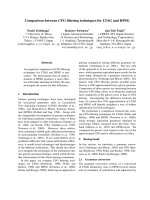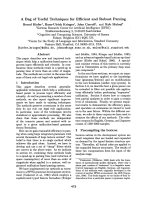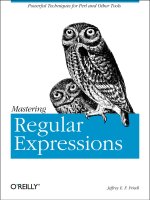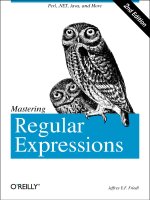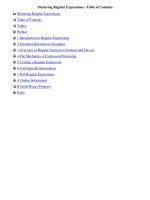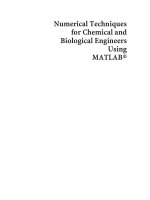o'reilly - mastering regular expressions powerful techniques for perl and other tools
Bạn đang xem bản rút gọn của tài liệu. Xem và tải ngay bản đầy đủ của tài liệu tại đây (2.92 MB, 780 trang )
Mastering Regular Expressions - Table of Contents
Mastering Regular Expressions
Table of Contents
Tables
Preface
1 Introduction to Regular Expressions
2 Extended Introductory Examples
3 Overview of Regular Expression Features and Flavors
4 The Mechanics of Expression Processing
5 Crafting a Regular Expression
6 Tool-Specific Information
7 Perl Regular Expressions
A Online Information
B Email Regex Program
Index
Mastering Regular Expressions
Powerful Techniques for Perl and Other Tools
Jeffrey E.F. Friedl
O'REILLY
Cambridge • Köln • Paris • Sebastopol • Tokyo
[PU]O'Reilly[/PU][DP]1997[/DP]
Page iv
Mastering Regular Expressions
by Jeffrey E.F. Friedl
Copyright © 1997 O'Reilly & Associates, Inc. All rights reserved.
Printed in the United States of America.
Published by O'Reilly & Associates, Inc., 101 Morris Street, Sebastopol, CA
95472.
Editor: Andy Oram
Production Editor: Jeffrey Friedl
Printing History:
January 1997: First Edition.
March 1997: Second printing; Minor corrections.
May 1997: Third printing; Minor corrections.
July 1997: Fourth printing; Minor corrections.
November 1997: Fifth printing; Minor corrections.
August 1998: Sixth printing; Minor corrections.
December 1998: Seventh printing; Minor corrections.
Nutshell Handbook and the Nutshell Handbook logo are registered trademarks
and The Java Series is a trademark of O'Reilly & Associates, Inc.
Many of the designations used by manufacturers and sellers to distinguish their
products are claimed as trademarks. Where those designations appear in this
book, and O'Reilly & Associates, Inc. was aware of a trademark claim, the
designations have been printed in caps or initial caps.
While every precaution has been taken in the preparation of this book, the
publisher assumes no responsibility for errors or omissions, or for damages
resulting from the use of the information contained herein.
Page V
Table of Contents
Preface xv
1: Introduction to Regular Expressions
1
Solving Real Problems
2
Regular Expressions as a Language
4
The Filename Analogy
4
The Language Analogy
5
The Regular-Expression Frame of Mind
6
Searching Text Files: Egrep
7
Egrep Metacharacters
8
Start and End of the Line
8
Character Classes
9
Matching Any Character—Dot
11
Alternation
12
Word Boundaries
14
In a Nutshell
15
Optional Items 16
Other Quantifiers: Repetition
17
Ignoring Differences in Capitalization
18
Parentheses and Backreferences
19
The Great Escape
20
Expanding the Foundation
21
Linguistic Diversification
21
The Goal of a Regular Expression
21
A Few More Examples
22
Page vi
Regular Expression Nomenclature 24
Improving on the Status Quo
26
Summary
28
Personal Glimpses
30
2: Extended Introductory Examples
31
About the Examples
32
A Short Introduction to Perl
33
Matching Text with Regular Expressions
34
Toward a More Real-World Example
36
Side Effects of a Successful Match
36
Intertwined Regular Expressions
39
Intermission
43
Modifying Text with Regular Expressions
45
Automated Editing
47
A Small Mail Utility
48
That Doubled-Word Thing
54
3: Overview of Regular Expression Features and Flavors.
59
A Casual Stroll Across the Regex Landscape 60
The World According to Grep
60
The Times They Are a Changin'
61
At a Glance
63
POSIX
64
Care and Handling of Regular Expressions
66
Identifying a Regex
66
Doing Something with the Matched Text
67
Other Examples
67
Care and Handling: Summary
70
Engines and Chrome Finish
70
Chrome and Appearances
71
Engines and Drivers
71
Common Metacharacters
71
Character Shorthands
72
Strings as Regular Expression
75
Class Shorthands, Dot, and Character Classes
77
Anchoring
81
Grouping and Retrieving 83
Quantifiers
83
[PU]O'Reilly[/PU][DP]1997[/DP]
Page vii
Alternation 84
Guide to the Advanced Chapters
85
Tool-Specific Information
85
4: The Mechanics of Expression Processing
87
Start Your Engines!
87
Two Kinds of Engines
87
New Standards
88
Regex Engine Types
88
From the Department of Redundancy Department
90
Match Basics
90
About the Examples
91
Rule 1: The Earliest Match Wins
91
The "Transmission" and the Bump-Along
92
Engine Pieces and Parts
93
Rule 2: Some Metacharacters Are Greedy
94
Regex-Directed vs. Text-Directed
99
NFA Engine: Regex-Directed
99
DFA Engine: Text-Directed 100
The Mysteries of Life Revealed
101
Backtracking
102
A Really Crummy Analogy
102
Two Important Points on Backtracking
103
Saved States
104
Backtracking and Greediness
106
More About Greediness
108
Problems of Greediness
108
Multi-Character "Quotes"
109
Laziness?
110
Greediness Always Favors a Match
110
Is Alternation Greedy?
112
Uses for Non-Greedy Alternation
113
Greedy Alternation in Perspective
114
Character Classes vs. Alternation
115
NFA, DFA, and POSIX
115
"The Longest-Leftmost"
115
POSIX and the Longest-Leftmost Rule 116
Speed and Efficiency
118
DFA and NFA in Comparison
118
Page viii
Practical Regex Techniques 121
Contributing Factors
121
Be Specific
122
Difficulties and Impossibilities
125
Watching Out for Unwanted Matches.
127
Matching Delimited Text
129
Knowing Your Data and Making Assumptions
132
Additional Greedy Examples
132
Summary
136
Match Mechanics Summary
136
Some Practical Effects of Match Mechanics
137
5: Crafting a Regular Expression
139
A Sobering Example
140
A Simple Change-Placing Your Best Foot Forward
141
More Advanced-Localizing the Greediness
141
Reality Check
144
A Global View of Backtracking
145
More Work for a POSIX NFA 147
Work Required During a Non-Match.
147
Being More Specific
147
Alternation Can Be Expensive
148
A Strong Lead
149
The Impact of Parentheses
150
Internal Optimization
154
First-Character Discrimination
154
Fixed-String Check
155
Simple Repetition
155
Needless Small Quantifiers
156
Length Cognizance
157
Match Cognizance
157
Need Cognizance
157
String/Line Anchors
158
Compile Caching
158
Testing the Engine Type
160
Basic NFA vs. DFA Testing
160
Traditional NFA vs. POSIXNFA Testing 161
Unrolling the Loop
162
Method 1: Building a Regex From Past Experiences
162
Page ix
The Real "Unrolling the Loop" Pattern. 164
Method 2: A Top-Down View
166
Method 3: A Quoted Internet Hostname
167
Observations
168
Unrolling C Comments
168
Regex Headaches
169
A Naive View
169
Unrolling the C Loop
171
The Freeflowing Regex
173
A Helping Hand to Guide the Match.
173
A Well-Guided Regex is a Fast Regex.
174
Wrapup
176
Think!
177
The Many Twists and Turns of Optimizations
177
6: Tool-Specific Information
181
Questions You Should Be Asking
181
Something as Simple as Grep
181
In This Chapter 182
Awk
183
Differences Among Awk Regex Flavors
184
Awk Regex Functions and Operators
187
Tcl
188
Tcl Regex Operands
189
Using Tcl Regular Expressions
190
Tcl Regex Optimizations
192
GNU Emacs
192
Emacs Strings as Regular Expressions
193
Emacs's Regex Flavor
193
Emacs Match Results
196
Benchmarking in Emacs
197
Emacs Regex Optimizations
197
7: Perl Regular Expressions
199
The Perl Way
201
Regular Expressions as a Language Component
202
Perl's Greatest Strength
202
Perl's Greatest Weakness
203
A Chapter, a Chicken, and The Perl Way 204
Page x
An Introductory Example: Parsing CSV Text 204
Regular Expressions and The Perl Way
207
Perl Unleashed
208
Regex-Related Perlisms
210
Expression Context
210
Dynamic Scope and Regex Match Effects
211
Special Variables Modified by a Match
217
"Doublequotish Processing" and Variable Interpolation
219
Perl's Regex Flavor
225
Quantifiers-Greedy and Lazy
225
Grouping
227
String Anchors
232
Multi-Match Anchor
236
Word Anchors
240
Convenient Shorthands and Other Notations
241
Character Classes
243
Modification with \Q and Friends: True Lies
245
The Match Operator 246
Match-Operand Delimiters
247
Match Modifiers
249
Specifying the Match Target Operand
250
Other Side Effects of the Match Operator
251
Match Operator Return Value
252
Outside Influences on the Match Operator
254
The Substitution Operator
255
The Replacement Operand
255
The /e Modifier
257
Context and Return Value
258
Using /g with a Regex That Can Match Nothingness
259
The Split Operator
259
Basic Split
259
Advanced Split
261
Advanced Split's Match Operand
262
Scalar-Context Split
264
Split's Match Operand with Capturing Parentheses
264
Perl Efficiency Issues 265
"There's More Than One Way to Do It"
266
Regex Compilation, the /o Modifier, and Efficiency
268
Unsociable $& and Friends
273
Page xi
The Efficiency Penalty of the /i Modifier 278
Substitution Efficiency Concerns
281
Benchmarking
284
Regex Debugging Information
285
The Study Function
287
Putting It All Together
290
Stripping Leading and Trailing Whitespace
290
Adding Commas to a Number
291
Removing C Comments
292
Matching an Email Address
294
Final Comments
304
Notes for Perl4
305
A Online Information
309
BEmail Regex Program
313
Page xiii
Tables
1-1 Summary of Metacharacters Seen So Far 15
1-2 Summary of Quantifier ''Repetition Metacharacters"
18
1-3 Egrep Metacharacter Summary
29
3-1 A (Very) Superficial Look at the Flavor of a Few Common Tools
63
3-2 Overview of POSIX Regex Flavors
64
3-3 A Few Utilities and Some of the Shorthand Metacharacters They Provide
73
3-4 String/Line Anchors, and Other Newline-Related Issues
82
4-1 Some Tools and Their Regex Engines
90
5-1 Match Efficiency for a Traditional NFA
143
5-2 Unrolling-The-Loop Example Cases
163
5-3 Unrolling-The-Loop Components for C Comments
172
6-1 A Superficial Survey of a Few Common Programs' Flavor
182
6-2 A Comical Look at a Few Greps
183
6-3 A Superficial Look at a Few Awks
184
6-4 Tcl's FA Regex Flavor
189
6-5 GNU Emacs's Search-Related Primitives 193
6-6 GNU Emacs's String Metacharacters
194
6-7 Emacs's NFA Regex Flavor
194
6-8 Emacs Syntax Classes
195
7-1 Overview of Perl's Regular-Expression Language
201
7-2 Overview of Perl's Regex-Related Items
203
7-3 The meaning of local
213
7-4 Perl's Quantifiers (Greedy and Lazy)
225
Page xiv
7-5 Overview of Newline-Related Match Modes 232
7-6 Summary of Anchor and Dot Modes
236
7-7 Regex Shorthands and Special-Character Encodings
241
7-8 String and Regex-Operand Case-Modification Constructs
245
7-9 Examples of m/…/g with a Can-Match-Nothing Regex
250
7-10 Standard Libraries That Are Naughty (That Reference $& and Friends)
278
7-11 Somewhat Formal Description of an Internet Email Address
295
Page xv
Preface
This book is about a powerful tool called "regular expressions."
Here, you will learn how to use regular expressions to solve problems and get the
most out of tools that provide them. Not only that, but much more: this book is
about mastering regular expressions.
If you use a computer, you can benefit from regular expressions all the time (even
if you don't realize it). When accessing World Wide Web search engines, with
your editor, word processor, configuration scripts, and system tools, regular
expressions are often provided as "power user" options. Languages such as Awk,
Elisp, Expect, Perl, Python, and Tcl have regular-expression support built in
(regular expressions are the very heart of many programs written in these
languages), and regular-expression libraries are available for most other
languages. For example, quite soon after Java became available, a
regular-expression library was built and made freely available on the Web.
Regular expressions are found in editors and programming environments such as
vi, Delphi, Emacs, Brief, Visual C++, Nisus Writer, and many, many more.
Regular expressions are very popular.
There's a good reason that regular expressions are found in so many diverse
applications: they are extremely powerful. At a low level, a regular expression
describes a chunk of text. You might use it to verify a user's input, or perhaps to
sift through large amounts of data. On a higher level, regular expressions allow
you to master your data. Control it. Put it to work for you. To master regular
expressions is to master your data.
[PU]O'Reilly[/PU][DP]1997[/DP]


